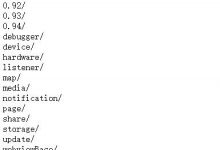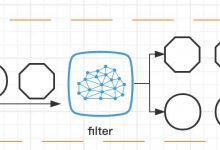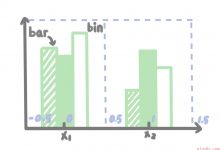IO
1、IO->Input Output
//构造方法
[code] public static void test1(){File file =new File(\"c:\\\\a\\\\b\\\\a.txt\");File file2 =new File(\"c:\\\\a\\\\b\",\"a.txt\");File path =new File(\"c:\\\\a\\\\b\");File file3 =new File(path,\"a.txt\");System.out.println(file+\",\"+file2+\",\"+file3);}
//常用方法
[code]public static void test4(){File file = new File(\"a.txt\"); //创建一个新文件System.out.println(file.isFile()); //判断是否为一个文件System.out.println(file.isDirectory()); //判断是否为一个文件夹System.out.println(file.getName()); //得到文件的名字System.out.println(file.getPath()); //得到文件相对的路径System.out.println(file.getAbsolutePath()); //得到文件的绝对路径System.out.println(file.length()); //得到文件内容的长度}
//文件的创建和删除
[code]public static void test21(){//当没有指明路径时,文件被默认创建在当前工程下File file = new File(\"c:\\\\a\\\\b\\\\c\");if(!file.exists()){boolean b = file.mkdirs();System.out.println(\"创建:\"+b);}else{boolean b = file.delete();System.out.println(\"删除:\"+b);}}
2、按照流的读写方式
字节流:字节流读取的时候,读到一个字节就返回一个字节,可以处理所有的类型数据。主要处理的是byte类型的数据,以byte数组为准,主要操作类是OutputStream、InputStream
字符流:字符流使用了字节流读到一个或多个字节,先去查指定的编码表,将查到的字符返回。只能处理字符数据。java提供了Reader、Writer两个专门操作字符流的类。
3、按照流的方向
输入流是写入数据,输出流是输出数据。
4、输入流的核心方法:read() 操作的数组类型
输出流的核心方法:write()
输入流:字节流使用InputStream,字符流使用Reader
输出流:字符流使用OutputStream,字符流使用Writer
转换流:使用InputStreamReader,OutputStream来关联,实际上是通过byte[]和String来关联
5、操作的数组类型
字节流:byte类型
字符流:char类型
6、FileInputStream和FileOutputStream
使用步骤:
选择流类(输入还是输出)
确定方法(read还是write)
关闭流 close
7、对象的输入流和输出流
对象的序列化:把对象转换成二进制的流,写到数据文件
对象的反序列化:把数据文件中二进制的流代表的数据,恢复为对象
8、按照是否能直接操作数据文件
节点流:直接在构造方法中传入要读写的文件对象或文件名
处理流:不直接在构造方法中传入要读写的文件对象或文件名
9、FileReader和FileWriter
10、缓冲流:BufferdReader 读取 和 BufferdWriter \\n
readLine() 成行读取
打印流:PrintWriter();
println();
11、转换流:InputStreamReader OutputStreamWriter
12、输入流和输出流是一个流对象:RandomAccessFile类
[code]public class Demo3 {public static void test1() throws IOException {FileWriter fw=new FileWriter(\"fw.txt\");fw.write(\"hello姬楚\");fw.close();}public static void test2() throws IOException {File file=new File(\"fw.txt\");if(!file.exists()) {file.createNewFile();}FileReader fr=new FileReader(file);char[] buf=new char[(int)file.length()];fr.read(buf);System.out.println(new String(buf));}//练习:复制fw.txt中的内容到fw1.txt文件中public static void test3() throws IOException {File file=new File(\"fw.txt\");if(!file.exists()) {file.createNewFile();}FileReader fr=new FileReader(file);char[] buf=new char[(int)file.length()];fr.read(buf);FileWriter fw1=new FileWriter(\"fw1.txt\");fw1.write(buf);fr.close();fw1.close();// fr.read(buf);// System.out.println(new String(buf));}
[code]public class Demo4 {public static void test1() throws IOException {PrintWriter pw=new PrintWriter(\"pw.txt\");pw.println(\"张三 123456 [email protected]\");pw.println(\"李四 123456 [email protected]\");pw.flush();//清空pw.close();}public static void test2() throws IOException {//创建一个缓存流的输入流的对象BufferedReader br=new BufferedReader(new FileReader(\"pw.txt\"));String str=\"\";//readLine方法:返回一行,如果返回值为null,说明文件内容读取完毕while((str=br.readLine())!=null) {String[] value=str.split(\"\\\\s\");String name=value[0];String phone=value[1];String email=value[2];System.out.println(\"name:\"+name+\",phone:\"+phone+\",email:\"+email);}br.close();}public static void test3() throws IOException {InputStream ins=new FileInputStream(\"ins.txt\");BufferedReader br=new BufferedReader(new InputStreamReader(ins));}
 爱站程序员基地
爱站程序员基地


